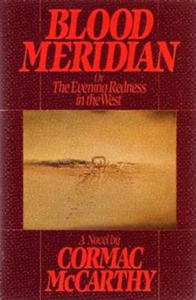
Blood Meridian – or The Evening Redness in the West
By Cormac McCarthy
337 pages
Published in April 1985 by Random House
I’m writing this review two hours before we meet to discuss the book. At this point, I’ve read about half of it. Normally, I’d feel uncertain about commenting on a novel I’d only half read, but not in this case. I’m quite certain that what’s ahead for me is more of what I’ve already experienced.
There isn’t much of a plot to Blood Meridian. It’s more like a travelogue – taking the reader through the seven circles of Cormac McCarthy’s vision of hell. There are four or five principal characters, but none can be described as a protagonist – not even “the kid.”
There is no character development to speak of. No anagnorisis. No peripetia. No denouement. But there is the kid’s tragic journey through a bleak and brutal landscape, described in language that is verbally lush, syntactically challenging – and always poetic. In fact, I have come to think of this book more as a prose poem than a novel.
Blood Meridian follows the kid, a teenage orphan with a penchant for violence, as he gets hooked up with a series of even more violent people while seeking his fortune in the US/Mexico borderland in the middle of the 19th century.
Some of the plot and at least two of the characters are based on historical accounts. One of them is John Glanton, the leader of a gang of thieves and murderers that, among other atrocities, randomly massacred indigenous Americans and Mexicans in 1949 and 1950. Another is Judge Holden, a character one could reasonably suppose to be a hybrid of Ahab, Kurtz, and Mephistopheles, but who was, in fact, a real person.
If Blood Meridian is verbally a prose poem, it is visually an orgy of charred and bludgeoned human bodies, broken skulls, bloody scalps, raped women, and hung and dismembered babies. Instead of a plot, the reader is delivered a litany of human cruelty, betrayal, and evil. These actions continue, almost unbroken, for 337 pages. You can open the book to any page, put your finger on any sentence, and you will be within 20 words of something that is ugly and/or violent and/or terrifying.
But the prose… It is the reason you want to keep on reading.
Blood Meridian is a literary achievement. It is Heart of Darkness played out on the Western Frontier, spare in sentimentality and brimming with Peckinpah-level carnage.
I’m eager to discover what my fellow Mules will say about it. I know at least one of them put the book down without finishing it. But Harold Bloom himself put it down twice before reading it through a third time and declaring it a masterpiece.
As I said, I am about halfway through the book. And so far, I’m not sure I’d rate Blood Meridian as highly as Bloom did. (Not that he would have needed my confirmation.) But I am certain that I will finish it – because even if it fails as a novel in some ways, it succeeds magnificently in so many others.
Critical Reception
* “Blood Meridian comes at the reader like a slap in the face, an affront that asks us to endure a vision of [hell]…. But while Cormac McCarthy’s fifth novel is hard to get through, it is harder to ignore. Any page of his work reveals his originality, a passionate voice given equally to ugliness and lyricism.” (Caryn James, New York Times, April 28, 1985)
* “McCarthy’s style is a pastiche of bad Faulkner, and his vocabulary is apparently drawn from Jacobean tragedies and translations of Beowulf…. The narrative is littered with portentous phrases like ‘Gods years’ and ‘lies by God lies.’ These… pronouncements, after a while, become irksomely hollow and pretentious…. Blood Meridian is certainly bold and disturbing – but does that make it a masterpiece?” (Allen Boyer, Detroit Free Press, March 24, 1985)
* “[Cormac McCarthy] is the writer all American writers have to measure themselves against.” (David Vann, The Guardian, Nov. 13, 2009)
 MarkFord
MarkFord